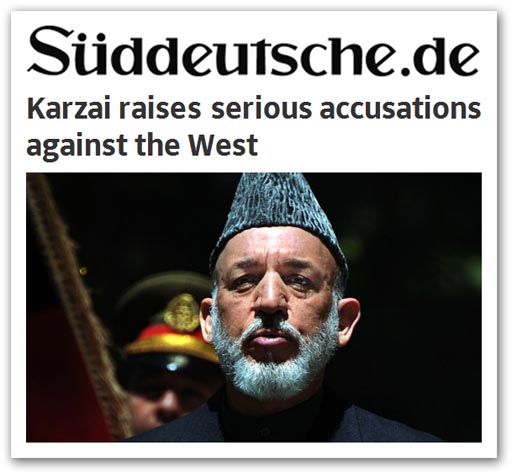Now we are on our way out, but that hasn't stopped Nick Carter, our General-on-the-spot, doing a bit of last-minute rent-seeking on behalf of the military.
He argues that cutting troops in theatre could "endanger" progress, declaring that: "It would be unforgivable if we allowed the gains of the last three years to be lost because we were not able to provide the Afghans with the support to take this through into 2014".
This delusional approach to Afghanistan is typical of the "top brass" who, better than most, are now realising that a nice, stable ongoing war is by far the best way of cut-proofing the Armed Forces.
Despite, his strident pleas, however – which first emerged in the Independent - there were no takers. "Politics is fast taking over", says the Independent. There is no political will for continued presence and neither side is prepared to exploit the issue.
As for the overview, it takes the regional German press, in the form of Süddeutsche Zeitung to go to top (for the moment) of the Afghan ladder, with an interview of soon to be ex-president Hamid Karzai.
Next year sees the Afghan presidential election, and Karzi is constitutionally disbarred from standing, so Süddeutsche caught him in a frank, critical mood. With nothing to lose, he complains – not without justice - of a lack of a comprehensible strategy.
The West, says Karzai, has not disrupted the safe havens for terrorists, nor their training camps, adding that the real problem lies in neighbouring Pakistan, which has not been addressed.
Whatever else, he says, that is the key to Karzai's thinking. Indian educated and very much in thrall to the political aspirations of the Indians, he is defending their $11 billion investment in the country, far larger than even the next biggest investor, China, which has a relatively modest $4.5 billion stake.
Those familiar with the Asian press, and particularly the Pakistani media, will be under no illusions that the conflict in Afghanistan has become a proxy war between Pakistan and India. And, with the US Geological Survey estimating that the mineral wealth in Afghanistan lies between €3-13 trillion – ranging from oil, gas, coal, copper, gold and precious stones, the stakes are huge.
But, without Nato forces to keep the tribal conflicts suppressed, the opportunities to exploit the wealth remain limited. Even recently, we recorded new British aid to the Afghan mining industry, but without security, it is unlikely that it can be properly used.
The trouble is that the political appreciation of the situation has always been alarmingly superficial.
We thus have Brigadier Bob Bruce, the commander of Task Force Helmand, acknowledging that there is no way the military is going to win a counter-insurgency [war] because it is essentially a political issue. But he then tells us this is "a battle of offers: the offer the government makes to the people and the offer the insurgents make to the people".
In fact, it is a proxy battle between two regional nuclear powers, India and Pakistan. And while Karzai, speaking for India, wants the coalition to "sort out" Pakistan, the other half of the equation is India. Until these two powers are forced to sit down at the same table, there will be no progress.
For want of a settlement, therefore, the UK and the rest of the coalition forces are effectively cast in the role of protecting Indian economic and political interests in the region. And if that is a worthy cause, it is not the deal for which we committed our Armed Forces.
Rather than complain about Nato, therefore, Karzai would be better off talking to his Indian sponsors, and demanding that they deal with the Pakistanis. With China, these are the regional powers, and only they can broker a lasting peace. It is about time they assumed their responsibilities, instead of expecting a solution on the back of our blood and wealth.
COMMENT THREAD
